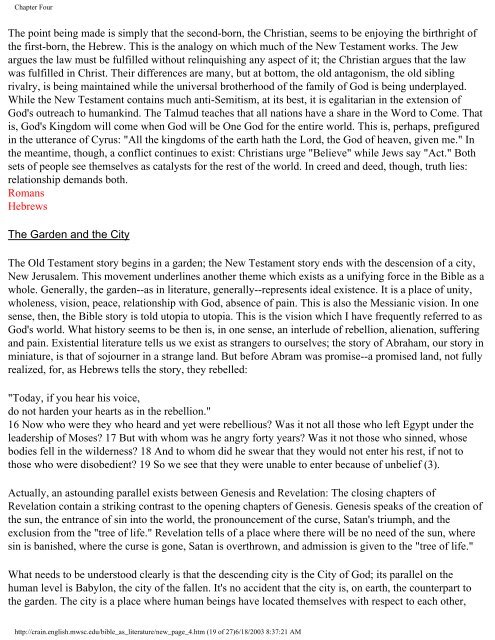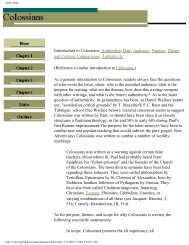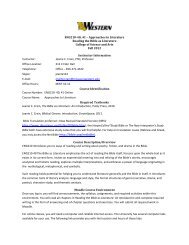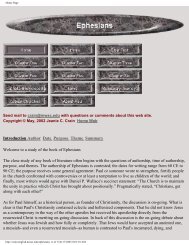Bible as Literature - Crain Home
Bible as Literature - Crain Home
Bible as Literature - Crain Home
Create successful ePaper yourself
Turn your PDF publications into a flip-book with our unique Google optimized e-Paper software.
Chapter Four<br />
The point being made is simply that the second-born, the Christian, seems to be enjoying the birthright of<br />
the first-born, the Hebrew. This is the analogy on which much of the New Testament works. The Jew<br />
argues the law must be fulfilled without relinquishing any <strong>as</strong>pect of it; the Christian argues that the law<br />
w<strong>as</strong> fulfilled in Christ. Their differences are many, but at bottom, the old antagonism, the old sibling<br />
rivalry, is being maintained while the universal brotherhood of the family of God is being underplayed.<br />
While the New Testament contains much anti-Semitism, at its best, it is egalitarian in the extension of<br />
God's outreach to humankind. The Talmud teaches that all nations have a share in the Word to Come. That<br />
is, God's Kingdom will come when God will be One God for the entire world. This is, perhaps, prefigured<br />
in the utterance of Cyrus: "All the kingdoms of the earth hath the Lord, the God of heaven, given me." In<br />
the meantime, though, a conflict continues to exist: Christians urge "Believe" while Jews say "Act." Both<br />
sets of people see themselves <strong>as</strong> catalysts for the rest of the world. In creed and deed, though, truth lies:<br />
relationship demands both.<br />
Romans<br />
Hebrews<br />
The Garden and the City<br />
The Old Testament story begins in a garden; the New Testament story ends with the descension of a city,<br />
New Jerusalem. This movement underlines another theme which exists <strong>as</strong> a unifying force in the <strong>Bible</strong> <strong>as</strong> a<br />
whole. Generally, the garden--<strong>as</strong> in literature, generally--represents ideal existence. It is a place of unity,<br />
wholeness, vision, peace, relationship with God, absence of pain. This is also the Messianic vision. In one<br />
sense, then, the <strong>Bible</strong> story is told utopia to utopia. This is the vision which I have frequently referred to <strong>as</strong><br />
God's world. What history seems to be then is, in one sense, an interlude of rebellion, alienation, suffering<br />
and pain. Existential literature tells us we exist <strong>as</strong> strangers to ourselves; the story of Abraham, our story in<br />
miniature, is that of sojourner in a strange land. But before Abram w<strong>as</strong> promise--a promised land, not fully<br />
realized, for, <strong>as</strong> Hebrews tells the story, they rebelled:<br />
"Today, if you hear his voice,<br />
do not harden your hearts <strong>as</strong> in the rebellion."<br />
16 Now who were they who heard and yet were rebellious? W<strong>as</strong> it not all those who left Egypt under the<br />
leadership of Moses? 17 But with whom w<strong>as</strong> he angry forty years? W<strong>as</strong> it not those who sinned, whose<br />
bodies fell in the wilderness? 18 And to whom did he swear that they would not enter his rest, if not to<br />
those who were disobedient? 19 So we see that they were unable to enter because of unbelief (3).<br />
Actually, an <strong>as</strong>tounding parallel exists between Genesis and Revelation: The closing chapters of<br />
Revelation contain a striking contr<strong>as</strong>t to the opening chapters of Genesis. Genesis speaks of the creation of<br />
the sun, the entrance of sin into the world, the pronouncement of the curse, Satan's triumph, and the<br />
exclusion from the "tree of life." Revelation tells of a place where there will be no need of the sun, where<br />
sin is banished, where the curse is gone, Satan is overthrown, and admission is given to the "tree of life."<br />
What needs to be understood clearly is that the descending city is the City of God; its parallel on the<br />
human level is Babylon, the city of the fallen. It's no accident that the city is, on earth, the counterpart to<br />
the garden. The city is a place where human beings have located themselves with respect to each other,<br />
http://crain.english.mwsc.edu/bible_<strong>as</strong>_literature/new_page_4.htm (19 of 27)6/18/2003 8:37:21 AM






![[38cb1273][0][sourcelist][1][0] - Crain Home](https://img.yumpu.com/2168350/1/190x245/38cb12730sourcelist10-crain-home.jpg?quality=85)